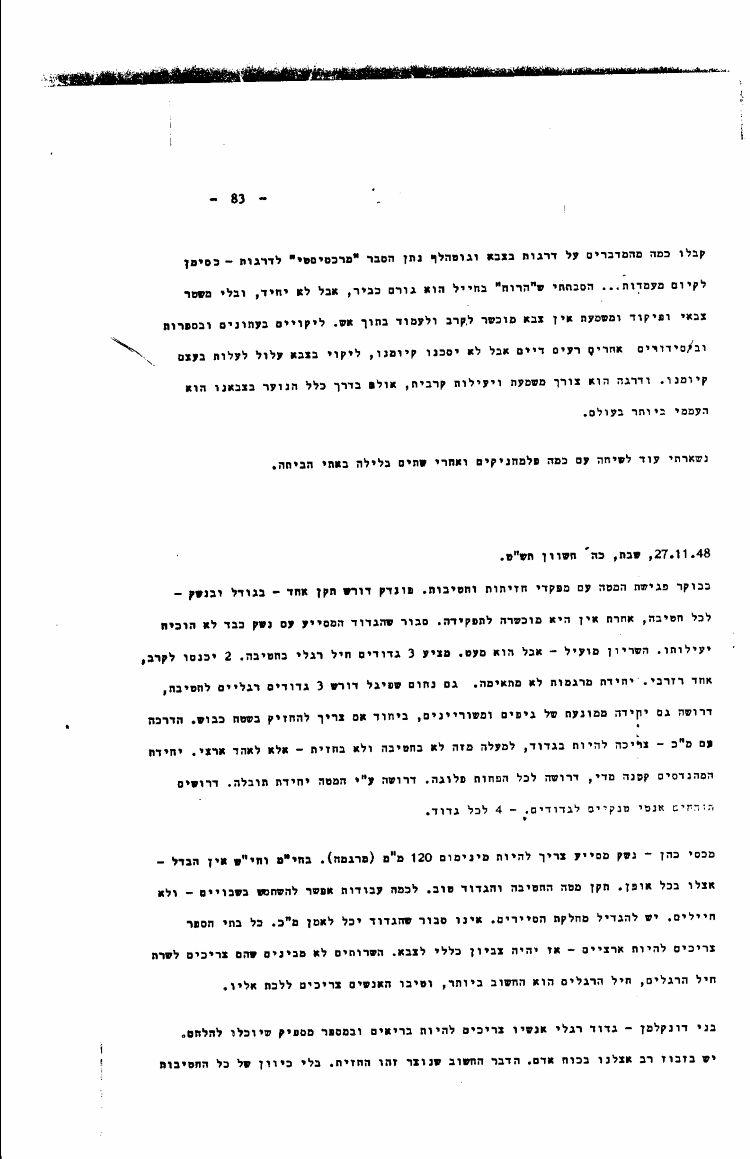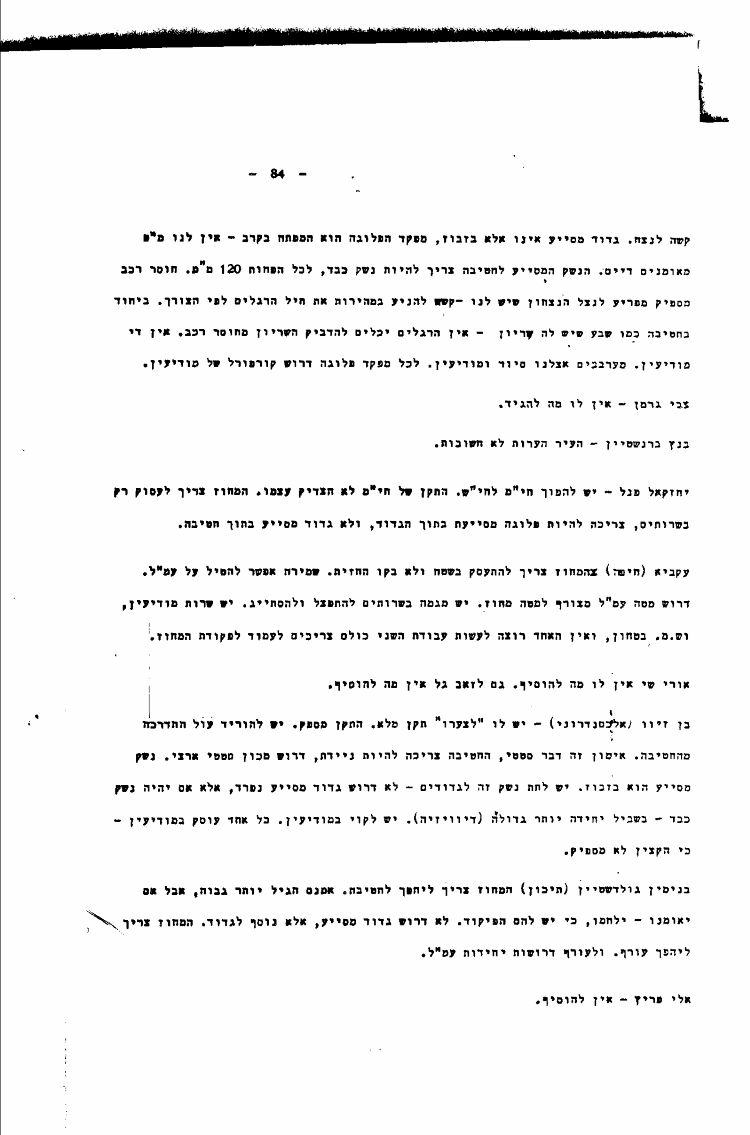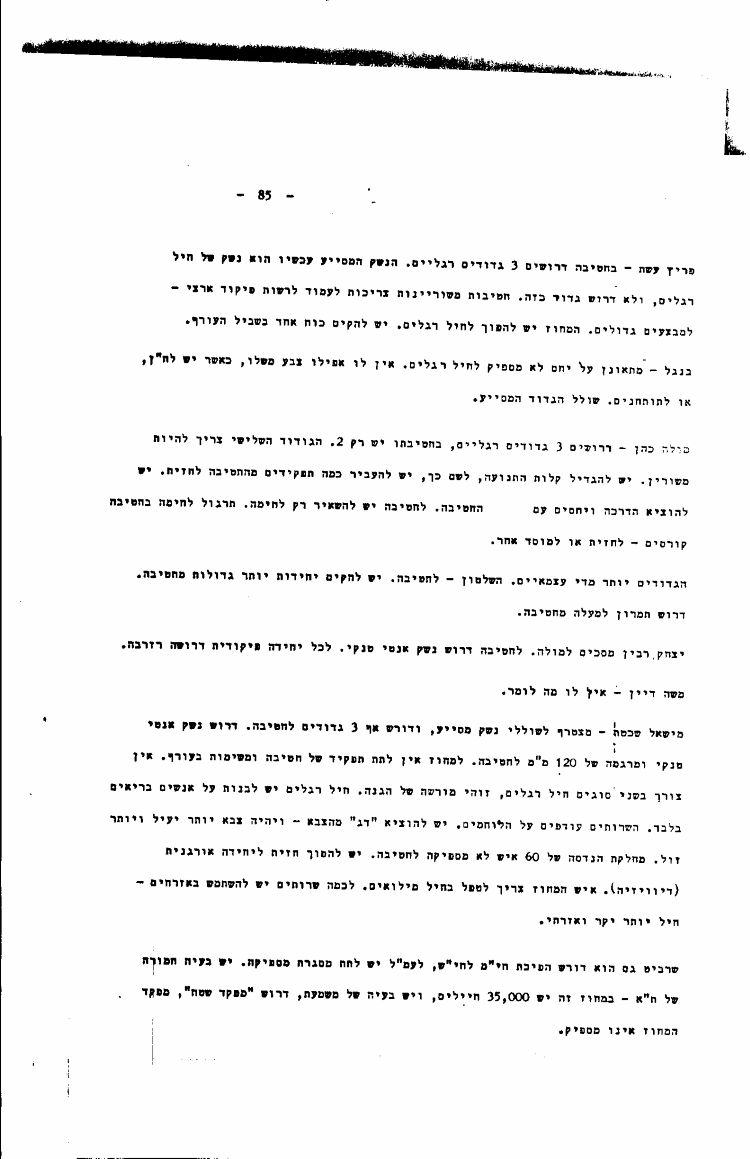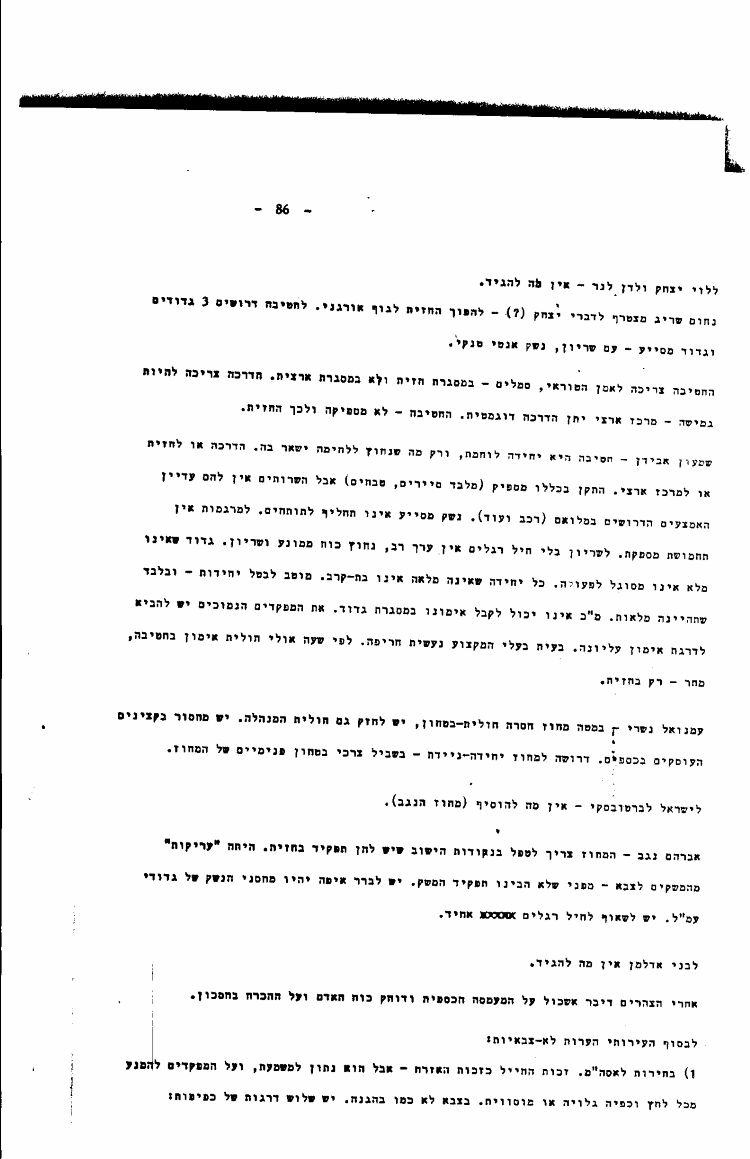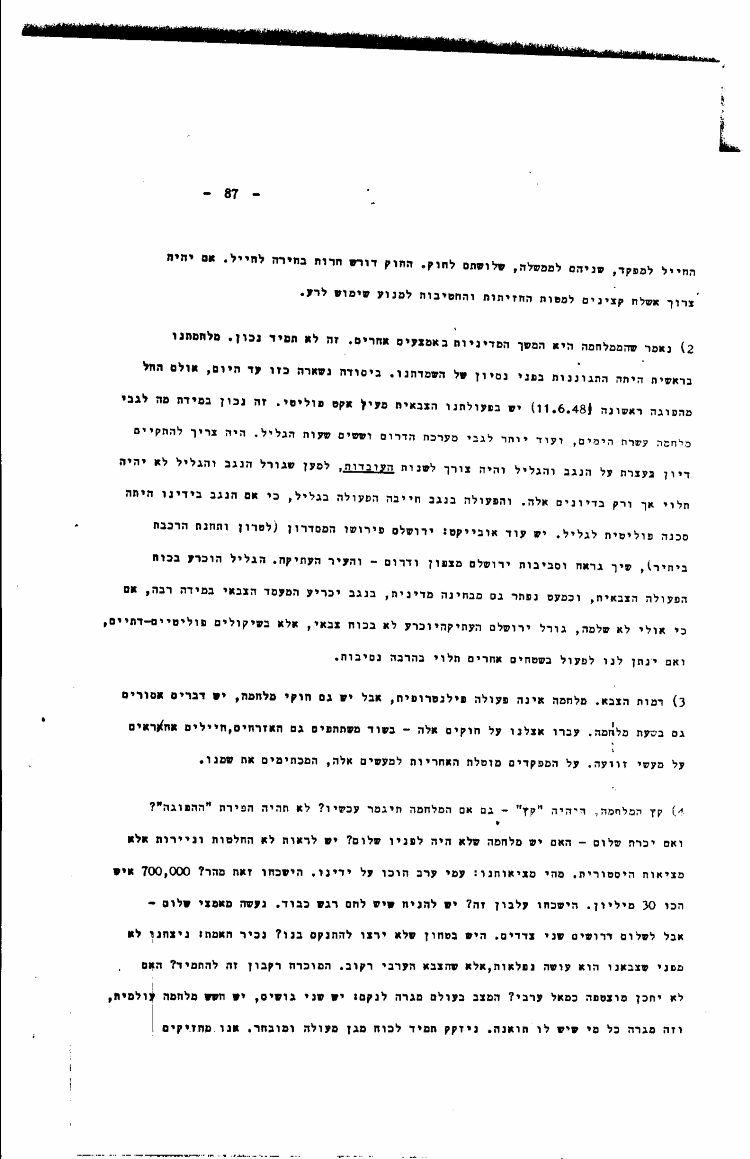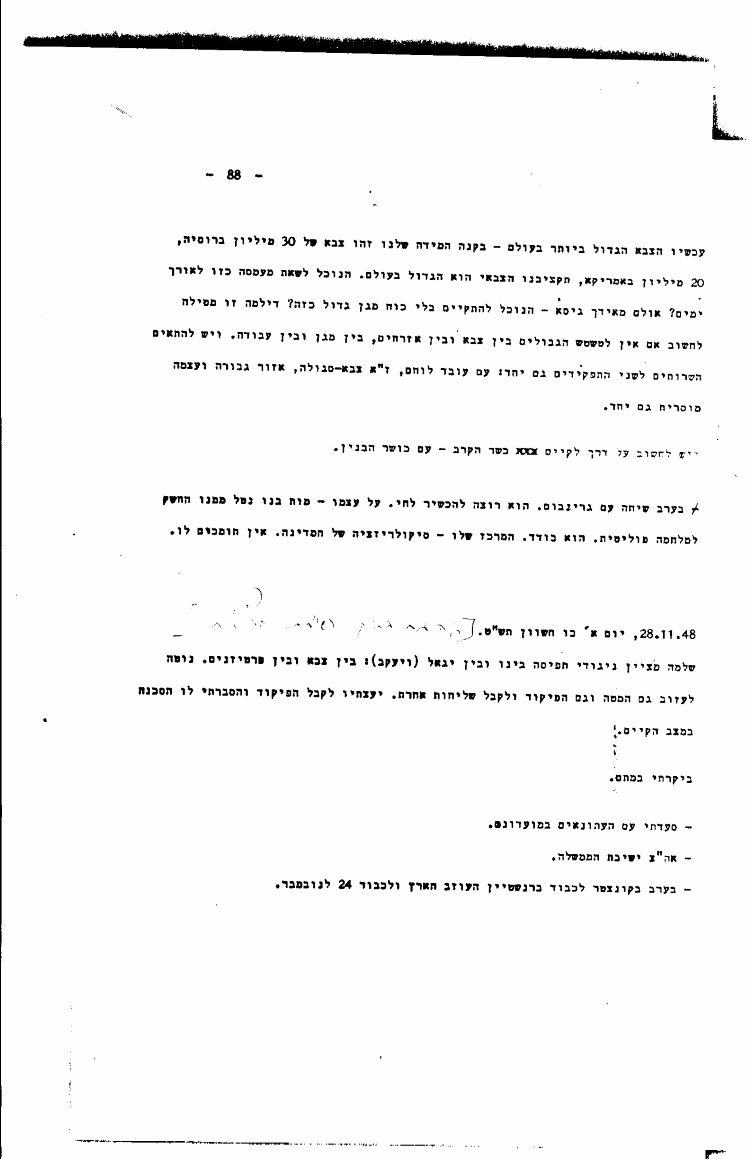1
of
27.11.1948
225144
Saturday, November 27, 1948 In the morning [General] Staff meeting with front and brigade commanders. [Oded Brigade Commander Yitzhak] Pundak insists on a uniform standard – in terms of size and weapons – for each brigade, otherwise it’s not suited to its task. He thinks that the auxiliary battalion with heavy weapons hasn’t proven its usefulness. The armored [unit] is useful – but it’s too small. He proposes 3 infantry battalions per brigade, 2 for combat, one on reserve. A mortars unit doesn’t fit. [Golani Brigade Commander] Nahum Spiegel [Golan] is also demanding 3 infantry battalions for the brigade. A mechanized unit with jeeps and armored vehicles is also required, especially if it’s necessary to hold onto occupied territory. Training up to the level of squad commander – should be in the battalion, beyond that not within the brigade or the front – but rather with a national Training Department [a school of the Training Department]. The engineers’ unit is too small. Need a company at the least. The Staff needs a transport unit. Need anti-tank cannons for the battalions – 4 for each battalion. [Carmeli Brigade Commander] Maxie Kahan – auxiliary weaponry should be minimum 120 mm (mortars) at a minimum. There’s no difference between garrison and Hayish – at least for him. The standard for the brigade and battalion staffs is good. For some jobs it’s possible to use POWs – rather than soldiers. Need to increase the patrols division. Doesn’t think that the battalion can train a squad commander. All the schools should be national – then there will be an all-encompassing character to the army. The services don’t understand that they need to serve the infantry corps. The infantry corps is the most important, and the best men should go there. [7th Brigade Commander] Benny Dunkelman – in an infantry battalion, the men should be healthy and enough in number to fight. We have a lot of wasted manpower. The most important thing that was created is the front [command]. Without directing the brigades it’s hard to win. An auxiliary battalion is a waste, the company commander is key during combat – we don’t have sufficiently trained platoon commanders. The auxiliary weaponry for the brigade should be heavy weapons, at least 120 mm. The lack of sufficient vehicles is preventing us from exploiting the victory we achieved – it’s hard to mobilize infantry quickly when needed, especially in a brigade such as Seven, which has an armored [unit] – infantry cannot keep up with the armored [unit] for lack of vehicles. There isn’t enough intelligence. Reconnaissance and intelligence are intermixed for us. Each company commander requires an intelligence corporal. [Northern Front Commander] Bentz Bernstein [Inbar] had unimportant remarks. [Newly appointed Carmeli Brigade Commander] Zvi Herman – has nothing to say. [Valley District Commander] Yehezkel Panet – garrison should be turned into Hayish. The garrison standard hasn’t justified itself. The district should focus only on services; there should be an auxiliary company within the battalion, not an auxiliary battalion within the brigade. [Avraham] Akavia (Haifa [District]). The district should be focused on the field and not on the frontline. Guard duty can be an assigned it to AMAL [military reservists conscripted for fixed periods of time]. Need an AMAL staff attached to the district staff. There’s a tendency in the services to divide and avoid. There’s an intelligence service and a defense I.S. [defense service], and neither wants to do the work of the other. All should be subject to the district command. Uri Shai [Shugorinsky] [sp.] has nothing to add. [Deputy Commander of the Northern Front for area defense] [Ze’ev] Gal [Glazer] has nothing to add either. Ben[-Zion] Ziv [Alexandroni]: “Sadly” for him he has a full standard. The standard is sufficient. The burden of [officer] training should be removed from the brigade. Training is a static thing, the brigade needs to be mobile; [we] need a static national institute [officer training center]. Auxiliary weaponry is a waste. These weapons should be given to the battalions – there’s no need for a separate auxiliary battalion, unless it’s heavy weapons – for a larger unit (division). There’s dysfunction in intelligence. Everyone engages in intelligence – because the officer isn’t enough. [Shomron District Commander] Binyamin Goldstein [Tzur] (Tichon [Central]): The district should become a brigade. Although they’re older, if they’re trained – they’ll fight, because they have the command. Don’t need an auxiliary battalion, but rather additional [weapons] for the [infantry] battalion. The district should become a homefront, and the homefront requires AMAL units. Eli Fritz [Fritsch-Dekel [sp.], administrative officer, Eastern Front] – nothing to add. Fritz [Shalom] Eshet [operations officer, Eastern Front]: A brigade requires 3 infantry battalions, auxiliary weaponry is currently infantry weapons, and such a battalion is needed. Armored brigades need to answer to national command – for major operations. The district should be turned into infantry. Need to establish a single force for the homefront. [Kiriati Brigade Commander Michael “James”] Ben-Gal – complains about inadequate regard for infantry. It doesn’t even have a color of its own, whereas WC [Women’s Corps], or artillery corps, does [the WC had a cap insignia, and artillery – a black beret]. Rejects the auxiliary battalion. [Yiftah Brigade Commander] Mulah Cohen: Need 3 infantry battalions (his brigade only has 2). The third battalion should be armored. Mobility should be increased. This requires transferring a few positions from the brigade to the front. [Officer] training and relations with the chief of staff (?) should be taken out of the brigade. Only fighting should remain part of the brigade. Combat practice in the brigade, [professional] courses – to the front or some other entity. The battalions are too independent, the authority – [belongs] to the brigade. Need to create units larger than the brigade. Maneuvering above the brigade [level] is necessary. [Southern Front Operations Officer] Yitzhak Rabin: Agrees with Mulah. The brigade requires anti-tank weapons. Each command unit requires a reserve. [Etsiyyoni Brigade Commander] Moshe Dayan: has nothing to say. [Deputy Commander of the Merkaz [Center] Front for area defense] Mishal Schechter [Shacham] – agrees with those rejecting auxiliary weaponry, and also demands 3 battalions per brigade. The brigade requires anti-tank weapons and 120 mm mortars. The district shouldn’t be given a brigade’s role or homefront missions. There’s no need for two types of infantry corps, this is a Haganah legacy. Infantry should be built on the basis of healthy men only. The services are superfluous to the fighters [the Headquarters’ units outnumber the combat units?]. “Deg[s]” [degenerates] should be removed from the army – and army will be more efficient and cheaper. An engineering platoon of 60 men isn’t enough for the brigade. The front should be turned into an organic unit (division). A district manager should handle the reserve corps. For some services civilians should be used – a soldier is more valuable than a civilian. [Tel Aviv District Commander Meir] Sharvit: also demands turning garrison into Hayish; AMAL should be given an adequate framework. There’s a serious problem regarding Tel Aviv – this district has 25,000 soldiers, and there’s a discipline problem. Need an “area commander”; the district commander isn’t enough. [Jerusalem District Commander] Yitzhak Levy and [Merkaz (Center) District operations officer] Dan Laner – nothing to say. [Negev Brigade Commander] Nahum Sarig concurs with Yitzhak (?) – make the front an organic body. The brigade requires 3 battalions and an auxiliary battalion – with armored [vehicles], anti-tank weapons. The brigade should train the corporal; sergeants – within the framework of the front, not as part of a national framework. [Officer] training should be flexible – a national center would provide dogmatic instruction. The brigade – isn’t enough, and therefore the front [is needed]. [Givati Brigade Commander] Shimon Avidan – a brigade is a fighting unit, and only what’s needed for fighting should remain part of it. [Officer] training – either to the front or a national center. The standard generally is sufficient (aside from patrols, cooks), but the services don’t yet have all of the necessary means (vehicles, etc.). Auxiliary weaponry is not a substitute for canons. There isn’t enough ammunition for the mortars. An armored [unit] without infantry doesn’t have much value; need a motorized force and armored [vehicles]. An incomplete battalion is not capable of action. Any unit that isn’t complete isn’t battle-ready. It’s better to eliminate units – and maintain full ones. A squad commander cannot receive his training in the framework of the battalion. The low-ranking commanders should be brought to the highest level of training. The problem of professionals is becoming acute. At this time perhaps the brigade has a training unit, tomorrow – only the front. [Shfela District Commander] Emanuel Nishri [Orlansky] [sp.]: The district staff is lacking a defense component; the administrative component also has to be strengthened. There’s a shortage of officers handling finances. The district needs a mobile unit – for the district’s internal defense needs. (Negev District [Commander]) Israel Libertovski – nothing to add. [Deputy Southern Front Commander for area defense] Avraham Negev – The district needs to handle the Yishuv localities that have a role at the front. There was “desertion” from the settlements to the army – because they didn’t understand the role of the settlement. It’s necessary to clarify where the AMAL battalions’ weapons storages will be. Need to aspire to a uniform infantry. Benny Edelman [Eden] [sp.] [administrative officer in the Southern Front] has nothing to say. In the afternoon [Levi] Eshkol spoke about the financial burden and manpower shortage, and the need for frugality. Finally I made some non-military comments: 1) Elections [to the Constituent Assembly]. The soldier has the same right as a civilian – but he’s subject to discipline, and the commanders must refrain from any overt or covert pressure or coercion. In the army, unlike the Haganah, there are three levels of subordination: the soldier [is subordinate] to the commander, both – to the government, all three – to the law. The law requires that the soldier be able to vote freely. If necessary, I’ll send officers to the front and brigade staffs to prevent abuse [of command powers in election matters]. 2) It’s been said that war is the continuation of policy by other means. This is not always true. At its outset our war was defensive because of the effort to annihilate us. Fundamentally it has remained so to this day, but since the first truce (June 11, 1948) our military action has been a political act of sorts. This is true to some extent with respect to the 10-day war [July 9-18], and even more so with respect to the southern campaign [Operation Yoav and Operation El HaHar] and the Galilee 60 hours [Operation Hiram]. There had to be a discussion in the [UN General] Assembly on the Negev and the Galilee, and it was necessary to change the facts, so that the fate of the Negev and the Galilee would not depend only on those discussions. The operation in the Negev necessitated the operation and the Galilee – because if the Negev is in our hands, it was a political threat to the Galilee. There’s another objective: Jerusalem, meaning the corridor (Latrun, and the Battir railway station), Sheikh Jarrah [the route to Mount Scopus], and the Jerusalem surroundings to the north and the south – and the Old City. The Galilee was decided by the power of military action, and has almost been resolved politically as well. In the Negev the military stance will be largely decisive, albeit maybe not completely. And whether we’ll be allowed to operate in other areas depends on many circumstances. 3) The image of the army. War is not a philanthropic activity, but war still has laws; there are things that cannot be done even in times of war. There were violations of these laws among us. Civilians participated in theft as well. Soldiers are responsible for atrocities. The responsibility for these acts lies with the commanders, who taint our name. 4) The end of the war. Will there be an “end” – even if the war concludes now? Will there be no violation of the “truce”? And if peace is reached – hasn’t there been war that was preceded by peace? [We] need to look not at resolutions and documents, but at historical reality. Our reality is: Arab nations were defeated by us. Will they soon forget that? 700,000 people defeated 30 million. Will they forget that insult? One should presume that they have a sense of honor. We’ll make peace efforts – but peace requires two sides. Is there a guarantee that they won’t try to take revenge against us? Let us recognize the truth: we won not because our army is miraculous, but because the Arab army is rotten. Will this rot necessarily persist? Is there no possibility of an Arab Mustafa Kemal [Ataturk]? The state of the world entices vengeance: there are two blocs, there’s fear of a global war, and this is enticing for anyone who has a grievance. We’ll always need an excellent and select protective force. We currently maintain the largest army in the world [relatively] – proportional to us, this is an army of 30 million in Russia, 20 million in America. Our military budget is the largest in the world [relatively]. Will we be able to bear such a burden over time? On the other hand – could we exist without such a large defensive force? This dilemma forces [us] to ponder whether the boundaries shouldn’t be blurred between army and civilians, between defense and work, and whether the services should be adapted to both functions alike. A working-fighting people, that is, a special army that embodies courage and moral power alike, and it’s necessary to think about how to maintain combat fitness – alongside construction fitness. – In the evening a conversation with [Yitzhak] Gruenbaum. He wants to legitimate LEHI. For himself – his son’s death eliminated his desire for political war. He’s alone. His center [main interest] – secularization of the state. He has no supporters.





